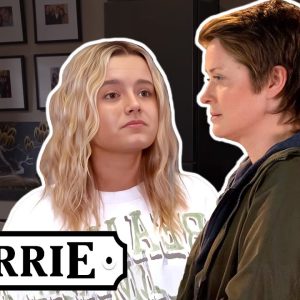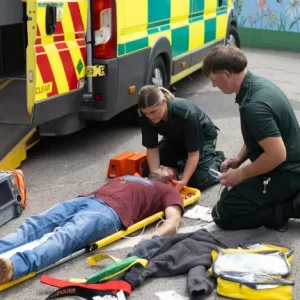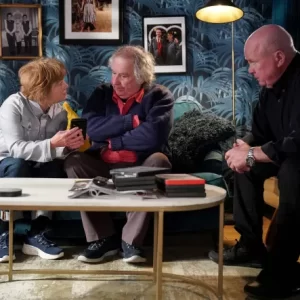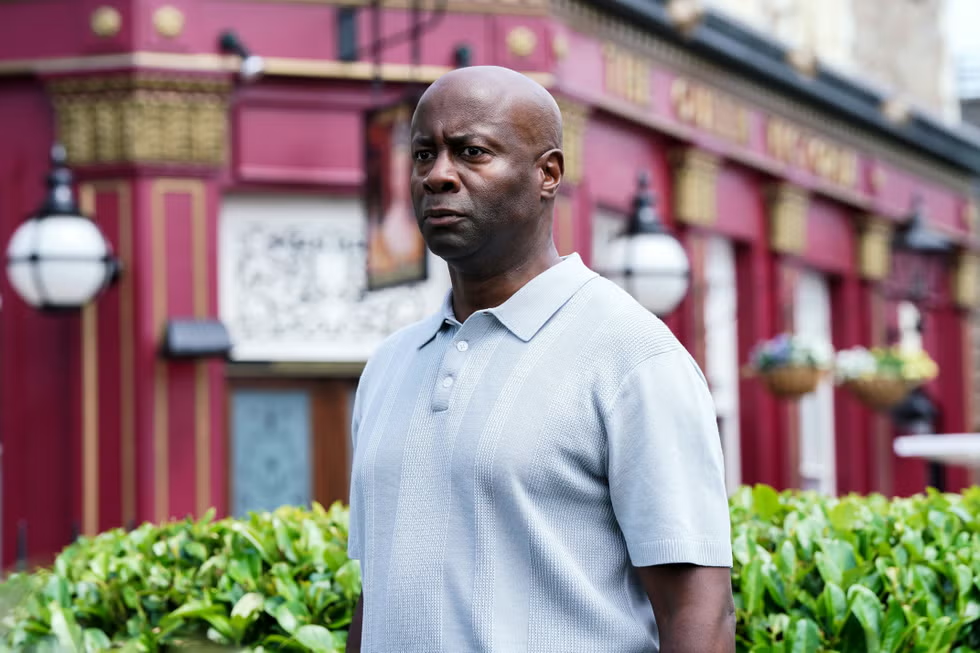General Hospital spoilers reveal a devastating new chapter for Drew Cain, one that threatens to reshape not only his future but also the lives of those around him. After being struck by two bullets that lodged dangerously in his spine, Drew’s survival became a miracle of modern medicine. Yet, what followed has left fans shaken—a storyline filled with pain, rage, desperation, and the haunting possibility that Drew may never fully recover.
The operating room became a battlefield of precision and determination. Surgeons fought relentlessly to remove the bullets, their every movement deliberate, knowing that a single slip could end Drew’s life. The bullets were lodged close to his spinal cord, making the procedure nearly impossible. Hours passed, and when the doctors finally emerged, exhausted and pale, the truth was revealed: Drew had survived, but his future was far from certain.
This news carried echoes of Curtis’s earlier ordeal, when his life had been upended by paralysis. Curtis’s eventual recovery had been a miracle in itself, but the doctors warned Drew’s family that his injuries were worse. Two bullets, far more extensive spinal damage, and shattered nerve endings meant the chances of walking again were slim. The reality was grim, and as Drew regained consciousness, it all came crashing down.
His awakening was a blur of pain and confusion. Harsh hospital lights burned into his vision as voices swirled around him. Then, he tried to move—and realized he could not. Panic surged through him. His breaths came ragged, his voice broke as he demanded answers. The doctors explained the situation in calm but unyielding terms: he was alive, but paralyzed. His recovery, if any, would be long and uncertain.
The word “paralysis” cut through him like a blade. Drew, a man who had lived his life as a soldier, a leader, a fighter, could not fathom being trapped in a chair. Rage filled the room as he lashed out at the doctors, unwilling to accept their prognosis. He wanted solutions, not pity. But the grim truth remained: full recovery was unlikely.
In the weeks that followed, Drew’s hospital room turned into a battlefield of a different kind. Physical therapy sessions ended in anger and despair. His therapists urged him to focus on what he could do, but Drew could only see what he had lost. Memories of his past strength—fearless missions, commanding respect—haunted him as he struggled with the simplest tasks. Each failed attempt to stand deepened his bitterness.
Isolation became his coping mechanism. He refused visitors, snapped at those who offered support, and spent hours staring at the ceiling. When Carly was finally allowed to visit, she tried to comfort him with gentle words, but Drew saw only pity in her eyes. That sympathy infuriated him. He did not want to be pitied. He did not want to be seen as broken.
Yet, amid his despair, a spark of defiance lingered. He remembered Curtis’s recovery, Kai Taylor’s miraculous turnaround, and other stories of men who had clawed back from the brink. If they could do it, why not him? This fragile hope soon became an obsession. He began searching for alternatives, desperate to find a way back to his old self.
That search led him into dangerous territory. Whispers of names like Jen Sidwell, Professor Henry Dalton, and Britt West reached him—figures tied to experimental treatments and shadowy benefactors who defied the boundaries of conventional medicine. Drew became consumed by the possibility that these people could offer him a cure, even if it came at a terrible cost.

The more he learned, the clearer it became: pursuing this path would mean giving up more than money. These pioneers operated in secrecy, bound to a mysterious master whose influence stretched beyond medicine. Aligning with them meant pledging loyalty to forces that demanded obedience in return for miracles.
Despite the risks, Drew pressed forward. His body, once his greatest weapon, now felt like a prison. He could not bear the thought of being dependent. And so, when the opportunity arose to meet Sidwell, Dalton, and Britt, he accepted without hesitation. They spoke of experimental procedures—nerve regeneration, spinal stimulation, radical surgeries. The risks included failure, further injury, or even death. Drew didn’t flinch. He agreed, no matter the cost.
But cost was the key word. These doctors didn’t want his money—they wanted his service. They needed someone with his skills, someone who could operate in the shadows. Drew realized the truth: he would not only be their patient, but also their soldier. Though a part of him recoiled at the idea, his hunger to walk again outweighed his pride. He accepted, surrendering his independence in exchange for a chance at salvation.
What followed was a grueling series of secret treatments. Drew disappeared from Port Charles for days at a time, enduring procedures that pushed his body to the limit. Electric shocks surged through his spine, experimental drugs burned through his veins, and surgeries left scars hidden beneath his clothes. The pain was excruciating, but each flicker of sensation in his legs fueled his determination.
Yet, progress came with chains. The organization began calling on him, assigning missions cloaked in secrecy. At first, it was transport tasks, moving materials without asking questions. But soon, the demands escalated. Drew realized he had become a pawn, his restored body purchased at the cost of his freedom.
The breaking point came when he was ordered to eliminate a target—an act of blood, not service. For the first time, Drew hesitated. He could endure pain, he could endure servitude, but he could not bring himself to cross that line. Defiance came at a cost. His handlers threatened to cut off his treatments, to undo his progress, to throw him back into the prison of paralysis.
It was Britt who made the difference. Though tied to the same organization, she slipped Drew crucial information—the identity of the master pulling the strings. If he wanted to be free, he had to face this man directly. Armed with that knowledge, Drew set out on a mission of his own.
What followed was a confrontation whispered about in secrecy. Drew faced the shadowy benefactor not as a broken man begging for mercy, but as a soldier determined to reclaim his life. Accounts differ on what happened—some say Drew destroyed the empire from within, others claim the master escaped, leaving only ruins behind.
What mattered was that Drew returned to Port Charles a changed man. He walked again—not perfectly, not without pain—but on his own terms. His family saw hope. Curtis saw resilience. Carly saw a survivor. And Britt, watching from afar, knew she had helped save him in ways no one else could understand.
Drew’s journey left him scarred, but it also left him free. He had stared into the abyss of despair, tasted the poison of false hope, and made his choice. He would no longer let anyone dictate the limits of his life. His future remained uncertain, but one truth was clear: Drew Cain had reclaimed his soul, even if it meant carrying the shadows of his past forever.





